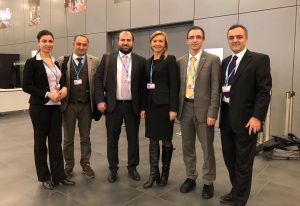
The 23rd Conference of the Parties (COP) of the United Nations Framework Convention on Climate Change (UNFCCC) took place under the presidency of Fiji and hosted by Germany. IKEM was also represented at the Climate Conference in Bonn.
After two weeks of negotiations, the climate conference COP 23 in Bonn ended on 18 November. As part of the central negotiations, delegates from 195 countries discussed, inter alia, the implementation of the Paris Agreement and the next steps towards more climate protection. For example, the contracting parties agreed on the procedure for drawing up transparency rules and reporting obligations. The criteria for measuring the carbon dioxide emissions of the individual states are to be decided next year at the summit in Katowice (Poland).
Despite these advances, it is known that the climate targets agreed in Paris are insufficient to limit global warming to well below two degrees. In order to pave the way for even more ambitious climate protection efforts, a review of the previous objective has been set for 2020. In this context, the so-called Talanoa Dialogue was launched, in which science, business and civil society should assess the overall impact of Nationally Determined Contributions (NDC). This evaluation and development process is particularly important for those countries that, like Fiji, are most affected by the effects of climate change.
One of the controversial points of this year’s climate summit was related to Turkey’s demand for access to the Green Climate Fund (GCF). The GCF provides funding for climate change mitigation and adaptation measures. Turkey is listed as an Annex I party in the UNFCCC and is therefore not considered a developing country. However, this is understood as a prerequisite for the possiblity of climate funding through the GCF.[1] At COP 23, no agreement was reached on this issue.
IKEM @ COP 23
IKEM was also represented in Bonn: Director Prof. Dr. med. Michael Rodi was a panel guest of the side event “How can transdisciplinary research contribute to greater advance of the energy transition?” where he presented his perspective on the decarbonisation of the transport sector. The side event is part of the research project Kopernikus ENavi and sought to bring together international climate experts in order to explore the contribution that cooperation between science, politics, business and civil society can make with regard to the energy transition.
IKEM’s representative, Aleksandra Novikova, PhD, served as a member of the Armenian delegation and negotiation team at the COP 23. The particular role of IKEM was to assist the government of Armenia with the implementation of UNFCCC commitments, in particular the implementation of Intended Nationally Determined Contributions (INDCs).
In addition, several employees took the opportunity to gather information about the activities of governments, NGOs and other stakeholders around the world, as well as to establish contacts for future projects and cooperations.
After COP 23, the first preparations for the next climate conference in Poland have already started. This is not only true for the international delegations: IKEM also wants to be represented at COP 24 and aims to host a side event to present and discuss the institute’s latest research.
Michael Rodi, Director of @IKEM_Berlin, speaks on decarbonising the transport sector at our #COP23 #ENavi event pic.twitter.com/pj5duiWktI
— IASS (@IASS_Potsdam) 15. November 2017

Contact Person:
Simon Schäfer-Stradowsky
Magazinstraße 15-16 , D-10179 Berlin
Tel. +49 (0)30 40 81 87 010
simon.schaefer-stradowsky@ikem.de
References:
[1] iccgov.org/
Further Information:



